May 21, 2025 | 21:31 GMT +7
May 21, 2025 | 21:31 GMT +7
Hotline: 0913.378.918
May 21, 2025 | 21:31 GMT +7
Hotline: 0913.378.918
After a decade of implementing the Party Congress Resolution on agriculture, Son La's agricultural landscape today boasts numerous achievements. These articles serve as a chronicle of the land and the people who have contributed to what many still call the agricultural phenomenon of Son La.
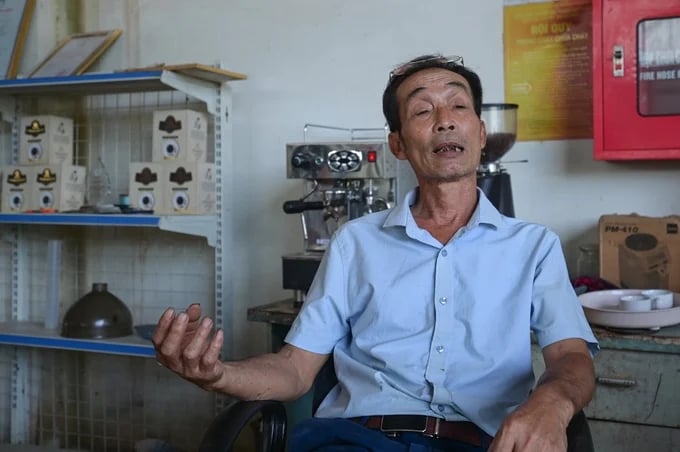
Mr. Nguyen Xuan Thao, Director of Bich Thao Coffee Cooperative. Photo: Tung Dinh.
Mr. Nguyen Xuan Thao, who initially worked as a welder, now stands as the Director of the renowned Bich Thao Coffee Cooperative. It is intriguing that a veteran leader in Son La province's agricultural sector recommended I meet him. When discussing Arabica coffee on Son La's sloping lands, few surpass this "welder"—a genius in the Northern Midlands and Mountains and Vietnam's foremost coffee Arabica expert.
"I was indeed a welder," laughed Nguyen Xuan Thao. "More accurately, a mechanic. I thought I'd spend my life with machines, but I found myself immersed in coffee, pursuing it for over thirty years now. I can't stop." He added that if the restructuring of crops on Son La's sloping lands is seen as a revolution, then preserving and developing the country's largest 21,000 hectares of Arabica coffee in Son La is a miracle.
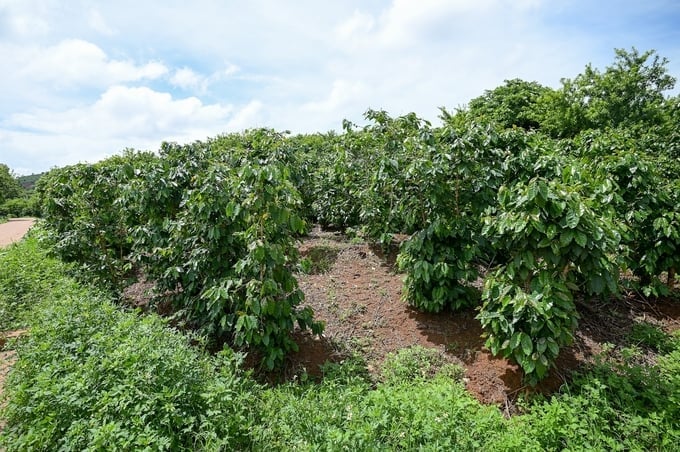
Arabica coffee trees in Son La. Photo: Tung Dinh.
Hua La, a long-established home of the Thai community, is located southwest of Son La city. Bordering the city, this fertile land turns as red as fresh buffalo meat when dug up. From Highway 6, one might think they are in the windy Central Highlands. The vast mountainous area is covered with fragrant coffee trees in the fruit-bearing season, occasionally interspersed with plots of mangoes and longans. Hua La, along with Mai Son and Thuan Chau, was one of the three locations where the French experimented with growing Arabica coffee in the early 20th century. In the 1990s, Arabica coffee became a key crop when the government promoted greening barren hills to alleviate hunger and reduce poverty in the Northwest highlands.
The director of the Bich Thao Coffee Cooperative took us around Hoang Van Thu village, which used to be part of Production Team No. 7, specializing in growing cassava and corn. As we walked, he recounted that in 1994, Arabica coffee trees were introduced to "climb uphill" in Hua La and subsequently spread to other key areas such as Mai Son and Thuan Chau. The plan at that time aimed for Son La to cultivate about 29,000 to 30,000 hectares of coffee. The state established the Son La Coffee Arabica and Fruit Company to provide seeds to farmers, replacing the cassava and corn fields, and also took on the task of consuming the products. However, within 4 to 5 years, the state-owned enterprise struggled to sustain the market, leading to a decline in interest. In key areas like Hua La, some farmers reverted to growing corn and cassava or switched to fruit trees. Arabica coffee in Son La faced a period of neglect. The situation worsened in 2014-2015, with fresh coffee berries priced at only 3,000 VND per kilo, while investment and care costs exceeded 5,000 VND.
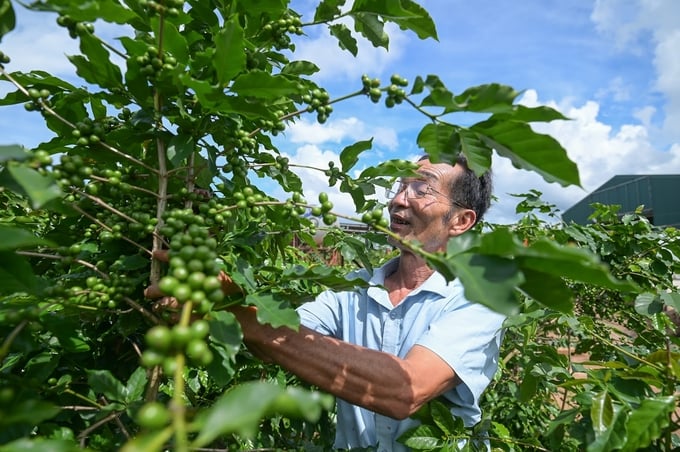
Hua La's transformative figure. Photo: Tung Dinh.
Like many in Hua La, Mr. Thao’s family owned about 4 hectares of Arabica coffee. "Seeing people destroying their coffee plants, I initially considered cutting mine down to switch to fruit trees or at least grow cassava or sugarcane to sell to companies," Mr. Thao recalled. "But then I reconsidered. Although coffee prices fluctuate, the government has never had to rescue it, and it has never been dumped like other agricultural products. So maybe the issue was with my approach."
Reflecting on this, Mr. Thao decided to leave his mechanical job and focus on transforming the fate of Son La's Arabica coffee. Inspired by Brazil, a country that has grown coffee for about 250 years longer than Vietnam, Mr. Thao questioned why Brazil could produce specialty coffees sold at the highest prices in the world while Vietnam struggled. After extensive research, he realized the problem lay in the processing stage, involving standards and product quality. From production to processing, the market must adhere to a chain of standards and understand local culture. Indiscriminate production, use of inorganic fertilizers, random harvesting, and haphazard processing would deter buyers.
In 2016, Mr. Thao founded Bich Thao Coffee Cooperative, the first of its kind in Son La province. His immediate goal was to shift to organic production, adopt natural fermentation methods, and transition from industrial to specialty coffee.
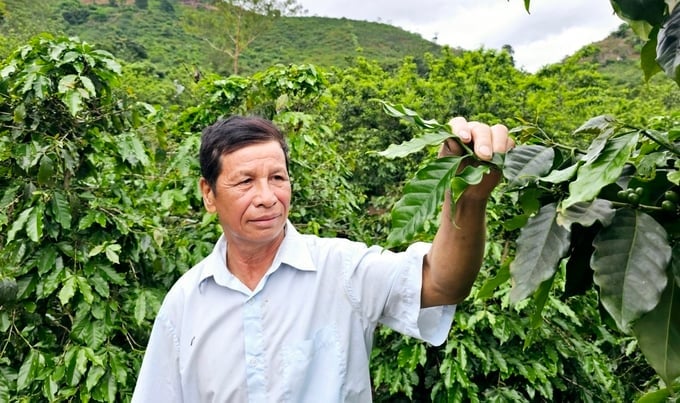
Thai people's 'golden tree' in Hua La. Photo: Hoang Anh.
Starting with his own garden, Mr. Thao invited scientists to study soil quality and offer technical advice. He explored new varieties like THA1, TN5, TN6, TN9, and TN10 from the Central Highlands, which are more resilient to climate change, pests, and drought, and produce higher yields with larger beans. After initial success, he expanded his efforts, going door-to-door to persuade villagers to convert. Initially, he faced resistance as coffee prices were low, and his suggestions seemed time-consuming and impractical.
To overcome this, Mr. Thao spent 1.5 billion VND to hire an Indian expert named Ipo, who guided cooperative members on specialty coffee production. It took over two months for members to grasp the value of specialty coffee. They learned a fermentation process that mimics the digestive process of civets, thanks to an enzyme in civet stomachs that acts as a fermentation catalyst. This allowed them to replicate the process manually without raising civets.
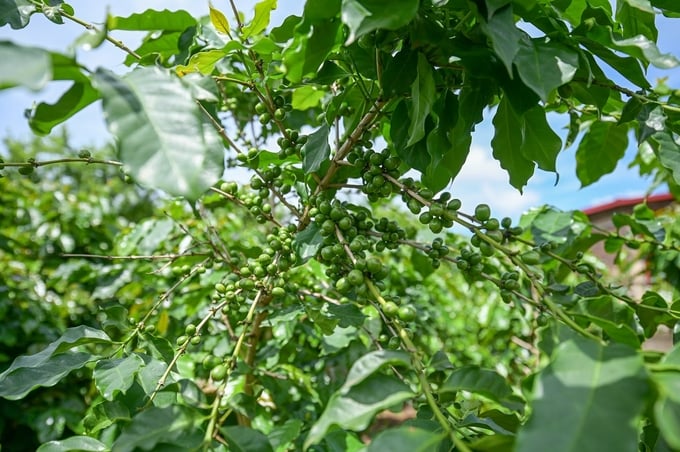
One hectare of tea coffee in Hua La can generate a profit between 1.2 and 1.8 billion VND. Photo: Tung Dinh.
The new method extended fermentation time from 10 hours to 30-40 hours, depending on weather conditions, sometimes up to 70 hours. After careful selection, the coffee beans were dried in greenhouses for 2-3 days, then milled, washed, and processed 90 days later. This labor-intensive process, learned from the Indian expert, enabled Bich Thao Coffee Cooperative to perfect natural fermentation, producing about 800 fruit aromas in Arabica coffee beans. They created different flavor profiles, catering to various markets, including honey, strawberry, and even durian flavors.
It took five years to penetrate the German market and seven years for the Japanese market. During this time, Bich Thao Coffee Cooperative refined its production and processing methods to meet the strictest standards of these demanding markets.
Each year, the cooperative exports about 6,000 tons of specialty coffee, typically priced around 230,000 VND/kg. Bich Thao's coffee products are exported to 20 countries, with the largest market being the US, receiving 2,000 - 4,000 tons annually. Besides coffee, Bich Thao is the first cooperative in Son La province to process Cascara leaves from coffee husks, which has anti-aging, fat-reducing, and liver enzyme-reducing properties. Each kilogram sells for 1.8 million VND, with exports to France fetching up to 8 million VND/kg. Orders are continuous, and Mr. Thao mentioned that this year there is no coffee left to sell. If trends continue, in 2-3 years, the coffee market in China will likely boom, and diligent coffee growers will prosper.
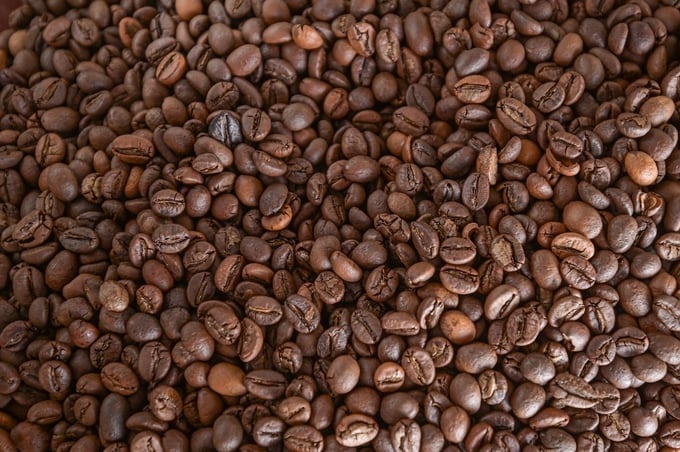
Sustainable coffee products of Bich Thao Coffee Cooperative. Photo: Tung Dinh.
Bich Thao is also the pioneer in processing freeze-dried instant coffee from high-quality Arabica beans. This innovation, another of Nguyen Xuan Thao's creations, involves selecting perfectly ripe coffee berries, extracting them into water, and drying them at -45 degrees Celsius to separate the water, leaving only coffee essence. After 30 hours, 40kg of pure coffee powder yields just 2kg of coffee essence. In 2022, Bich Thao Coffee Cooperative was certified by the Ministry of Agriculture and Rural Development for its 5-star OCOP standard products, being the only unit to achieve the highest OCOP standard at that time.
“Compared to Cau Dat (Lam Dong) or Huong Hoa (Quang Tri), Arabica coffee trees in Son La may not have ideal conditions in terms of altitude or climate. In return, they have sunlight conditions. With a large area, favorable for organizing production to create large raw material areas and investing in deep processing, Son La coffee will easily form a large-scale industry serving exports,” affirmed the Director of the Bich Thao Coffee Cooperative.
Translated by Quynh Chi

(VAN) At the conference to disseminate Resolution No. 68, AgriS introduced its digital agricultural ecosystem and reaffirmed its commitment to accompanying the Government in promoting private sector development and sustainable agriculture.

(VAN) 'Blue Ocean - Blue Foods' initiative is designed to restore marine ecosystems and establish sustainable livelihoods for local communities by cultivating a minimum of 1,000 hectares of cottonii seaweed in the first three years.
/2025/05/21/4642-3-112707_603.jpg)
(VAN) The V-SCOPE project has made direct contributions to three out of six pillars of the Comprehensive Strategic Partnership between Vietnam and Australia.

(VAN) Facing the threat of rabies spreading to the community, Gia Lai province urgently carries out measures to vaccinate dogs and cats on a large scale.

(VAN) Disease-free livestock farming not only protects livestock herds but also stabilizes production and livelihoods for many farmers in Tuyen Quang.

(VAN) Japan's grant aid project contributes to capacity building, promoting organic agricultural production, and fostering sustainable community development in Dong Thap province.

(VAN) For years, the CRISPR-Cas9 genome technology has been reshaping genetic engineering, a precision tool to transform everything from agriculture to medicine.